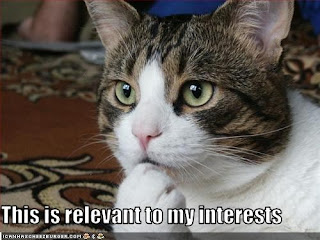I'm at one of those points in the semester where I've been putting so many words together that the idea of putting more words together makes me feel the lethargic despair people have in mind when they use words like "Sisyphean."
Normally in this situation I would look at my "blog ideas" note, where I put down all potential blog ideas -- even ones that seem dumb, weird, and unpromising. In case you're interested, rejected topics today include "hair" -- in which i was going to say something how the energy of hair-styling in post-Maria Puerto Rico is both life affirming and makes me appreciate how hair-lazy I am, "The sad side of fine-tuned consumer preferences" -- which was going to explore the very distinctive kind of grimness I associate with hearing someone express detailed knowledge about what seem to me manufactured differences in things I'd never be interested in buying anyway, and "stupid capitalist dilemmas," which would have focused on annoying questions like "Is it ethically wrong to opt out of targeted advertising on a site whose existence and profitability you want to continue?"
But today, I'm not up to it. Instead I'll share with you this photograph that I took at the gym. As a philosopher, I'm used to having my mind philosophizing in non-philosophizing contexts. I remember some motivational poster at the gym years ago that said that if you set aside worry about the future and regret about the past, you would be happy in the present. I was like .. that is clearly not true. I can be unhappy about the present just as well as I can about the future or the past. Just watch me.
Here it is:
As you can see, here we have another philosophically rich idea: "Choose progress over perfection."
Because I'm naturally grouchy and argumentative, when I saw this my first thought was to try to think how wrong it was. But then I started thinking about it, and actually "choosing progress over perfection" is something I do all the time. Perfection is paralyzing. Even having high standards can get in your way. I was a little shocked to realize how often I deflate my own anxieties by saying to myself, "Well, whatever. Just keep this moving forward into the next step, and then you can see how it's going."
I would even go so far as to say that it may be the areas where perfection rings your bell can be the areas where it's the most difficult to move forward, because choosing progress over perfection becomes so difficult. When I was a kid I was into music, and I took lessons, first on the flute and later on the piano. I loved the piano, but I loved it in this weird way where my own deficiencies as a learner drove me crazy with frustration. I knew, intellectually, that I would have to practice and improve slowly. But hearing myself produce music that sounded bad? I couldn't handle it emotionally.
Though I'm invested in my intellectual work and writing, I'm not invested in them in that way. I have the same problem of being endlessly unhappy with what I produce, but for some reason it doesn't give me that intense feeling of rage and irritation. So in that domain, I really can choose progress over perfection.
I would go so far as to say that "choose progress over perfection" is useful advice for a lot of intellectual and creative work. These kinds of projects are psychologically demanding along multiple dimensions. The blank page, the critic in your head, yada yada yada.
We need all the tools we can get. If some of them come from stupid sports slogans, so what? Maybe they're actually on to something.


